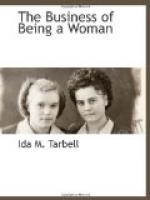The present effort of the serious-minded to meet the case takes two general directions, natural enough outgrowths of the original militancy. The first of these is a frank advocacy of celibacy. “Celibacy is the aristocracy of the future,” is the preaching of one European feminist. It is a modification of the scheme by which the medieval woman sought to escape unrest. Four hundred years ago a woman sought celibacy as an escape from sin; service and righteousness were her aim. To-day she adopts it to escape inferiority and servitude; superiority and freedom her aim.
The ranks of the woman celibates are not full. Many a candidate falls out by the way, confronted by something she had not reckoned with—the eternal command that she be a woman. She compromises—grudgingly. She will be a woman on condition that she is guaranteed economic freedom, opportunity for self-expressive work, political recognition. What this amounts to is that she does not see in the woman’s life a satisfying and permanent end. There are various points at which she claims it fails. It is antagonistic to personal ambition. It makes a dependent of her. It leaves her in middle life without an occupation. It keeps her out of the great movements of her day—gives her no part in the solution of the ethical and economical problems which affect her and her children. She declares that she wants fuller participation in life, and by life she seems to mean the elaborate machinery by which human wants are supplied and human beings kept in something like order; the movements of the market place, of politics, and of government.
Now if there were not something in her contention, the Uneasy Woman would not be with us as she is to-day, more vociferous, more insistent than ever in the world’s history. What is there in her case?
If the cultivation of individual tastes and talents to a useful, productive point is out of question in the woman’s business, if it is not a part of it, something is weak in the scheme. Something is weak if the woman is or feels that she is not paying her way. Both are not only individual rights; they are individual duties.
Moreover, she is certainly right to be dissatisfied, if, after spending twenty-five years, more or less, she is to be left in middle life, her forces spent, without interests and obligations which will occupy brain and heart to the full, without important tasks which are the logical outcome of her experience and which she must carry on in order to complete that experience.
But what is the truth about it? What is the Business of Being a Woman? Is it something incompatible with free and joyous development of one’s talents? Is there no place in it for economic independence? Has it no essential relation to the world’s movements? Is it an episode which drains the forces and leaves a dreary wreck behind? Is it something that cannot be organized into a profession of dignity, and opportunity for service and for happiness?




